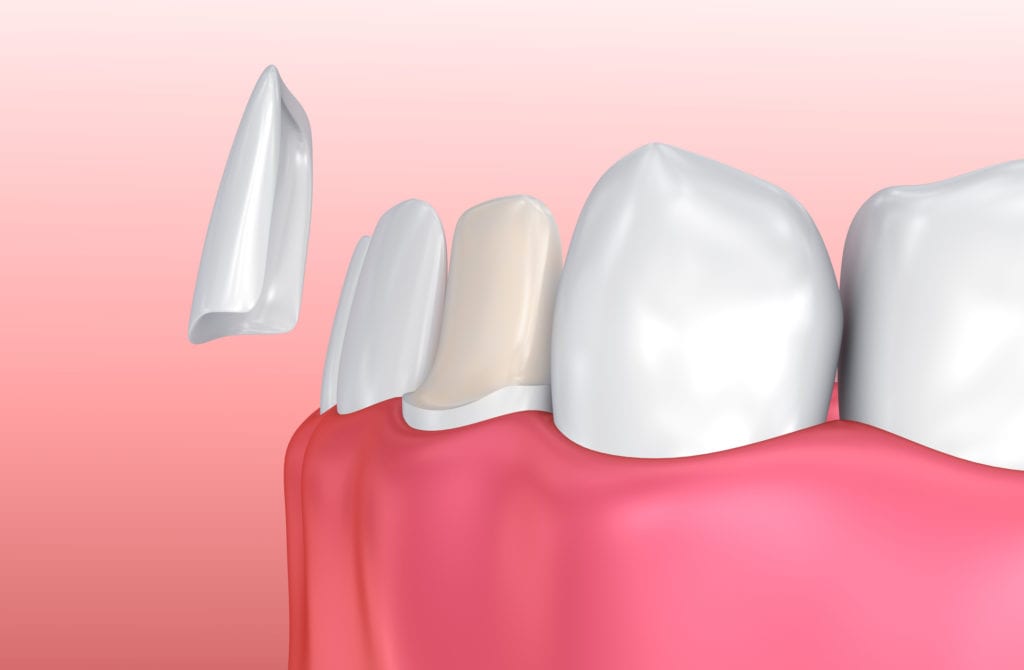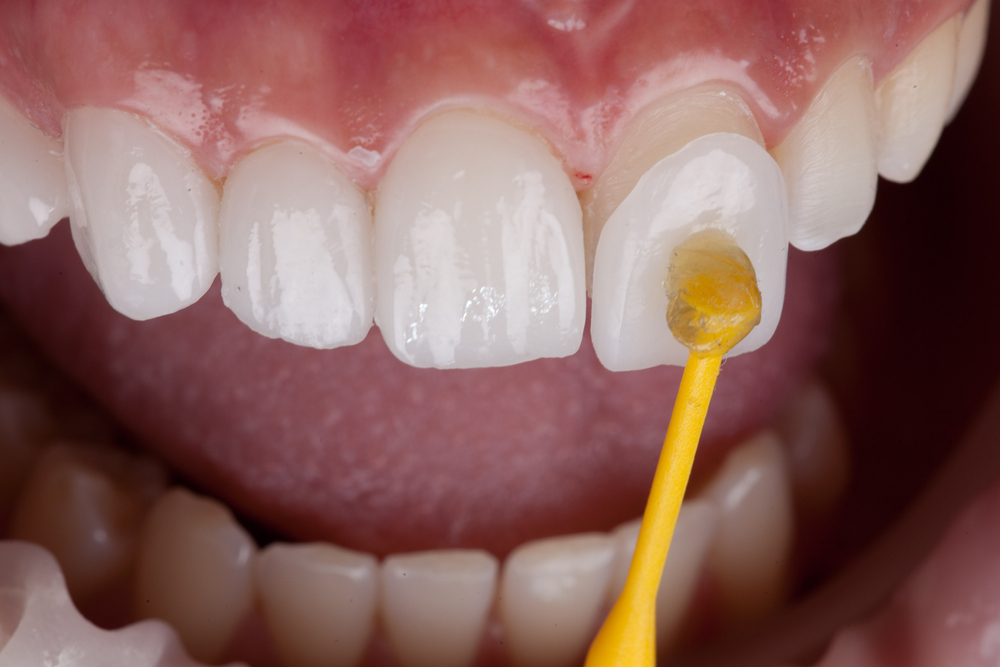Opening the Keys of Veneers: Realities, Types, and Advantages for an Attractive Smile
Veneers supply a compelling solution for those seeking to enhance their smiles. These oral enhancements can address different imperfections, from staining to imbalance. With choices like porcelain and composite, individuals can pick based on their requirements and choices. Recognizing the nuances of veneers, consisting of application and care, is vital. What aspects should one think about prior to deciding? The responses might stun those interested in this visual dental choice.

Understanding Veneers: What Are They?
Veneers are slim, tailor-made shells designed to cover the front surface area of teeth, boosting their look. Generally crafted from durable products, these shells are tailored to fit each person's teeth precisely. They serve several objectives, including remedying visual flaws such as staining, chips, or voids. The application process involves a dental practitioner preparing the teeth, commonly by removing a percentage of enamel to ensure a tight fit. When prepared, the veneers are bonded to the teeth utilizing a solid adhesive.
Clients frequently select veneers for their capability to produce a natural-looking smile while giving a lasting solution to dental imperfections. Unlike various other aesthetic dentistry choices, veneers call for marginal invasive treatments, making them a preferred choice. The outcome is an improved smile that can considerably increase an individual's confidence and self-esteem. In general, veneers offer an effective approach to accomplishing an extra appealing and harmonious oral appearance.
Sorts of Veneers: Porcelain vs. Compound
When considering cosmetic dental choices, two key kinds of veneers stand out: porcelain and compound. Porcelain veneers are crafted from a long lasting ceramic product that resembles the all-natural appearance of teeth. They are recognized for their stain resistance and ability to mirror light likewise to natural enamel, giving a visual appeal that many people need. The application procedure usually involves even more preparation of the tooth structure and may require multiple visits to the dental practitioner.
On the other hand, composite veneers are made from a tooth-colored material that is straight related to the teeth. This type permits quicker application and can typically be completed in a single check out. While they are much less costly than porcelain veneers, they may not provide the exact same long life or resistance to staining. Ultimately, the choice in between porcelain and composite veneers depends on individual choices, budget plan, and particular oral needs.
The Benefits of Picking Veneers
Choosing veneers supplies many benefits that can significantly improve both the looks and functionality of an individual's smile. Among the key advantages is their capacity to fix blemishes such as staining, gaps, and imbalance, leading to a more uniform appearance. Veneers can additionally boost the sturdiness of teeth, giving a protective layer that shields them from damages.
Additionally, they require very little tooth prep work compared to various other oral treatments, preserving even more of the natural tooth framework. This conservation adds to a healthier dental environment while still accomplishing a stunning smile.
Veneers are extremely adjustable, permitting individuals to choose the form, dimension, and shade that best matches their preferences. Additionally, they are stain-resistant, making it much easier to keep a eye-catching and brilliant smile in time. Generally, veneers present an efficient option for those seeking both cosmetic enhancement and long-term oral health advantages.
The Veneer Application Process
The veneer application procedure involves numerous key actions to ensure ideal results. Initially, an examination is performed to analyze the person's requirements, followed by the prep work and shaping of the teeth. The veneers are bonded in area, with modifications made for an excellent fit and appearance.
First Consultation Tips
A complete first assessment is crucial for anyone thinking about veneers, as it sets the structure for an effective therapy. During this conference, the dental expert assesses the person's dental wellness, reviewing any type of existing issues that could impact the veneer application. This analysis might include X-rays and a visual exam to figure out the condition of the gums and teeth.
The dental professional likewise engages the person in a comprehensive discussion about their aesthetic objectives, choices, and assumptions. They might present various veneer options tailored to the individual's specific needs. In addition, the specialist explains the treatment, potential threats, and aftercare requirements, ensuring that the person is comfy and educated before continuing with the therapy.
Prep Work and Shaping Teeth
After the first assessment, the next stage entails the preparation and shaping of the teeth to suit the veneers. This vital action is executed by the dental professional, who carefully examines the tooth structure to figure out the quantity of enamel that requires to be gotten rid of. Commonly, a thin layer, typically around 0.5 millimeters, is slashed off to guarantee a correct fit for the veneers. Accuracy is extremely important during this procedure, as it affects both the overall comfort and the aesthetic end result. When the teeth are properly shaped, impacts are required to create custom-made veneers that align completely with the patient's oral profile. This thorough prep work sets the phase for a successful veneer application, enhancing both look and feature.
Bonding and Last Adjustments
Adhering to the shaping and preparation of the teeth, the bonding procedure starts, marking an important stage in the veneer application. During this stage, an oral adhesive is related to the prepared tooth surface area, ensuring a solid bond in between the veneer and the tooth. The dental expert meticulously places the veneer, making adjustments to attain the desired alignment and visual appeals. As soon as appropriately put, an unique light is used to treat the sticky, solidifying the bond. After treating, the dental expert carries out last changes, trimming any kind of excess product and fine-tuning the veneer's form to guarantee an all-natural appearance. This careful interest to information enhances both function and appearances, adding to a total stunning smile that is resilient and long-lasting.
Taking care of Your Veneers: Upkeep Tips
Taking care of veneers is crucial to preserve their look and longevity. A consistent day-to-day cleaning routine, conscious avoidance of tarnishing foods, and regular dental check-ups are vital parts of efficient upkeep. These methods aid guarantee that veneers stay in peak condition and continue to enhance one's smile.
Daily Cleansing Regimen
Regularly preserving veneers is necessary for their durability and look. A correct everyday cleansing regimen can aid protect their luster and avoid damages. Dental practitioners suggest cleaning twice a day with a soft-bristled toothbrush and fluoride tooth paste, making sure that all surface areas are cleansed gently to stay clear of scratching the veneer surface area. Flossing everyday is likewise essential to remove food bits and plaque from between teeth, where brushes might not get to. Additionally, utilizing an antimicrobial mouthwash can aid keep dental health without damaging the veneers. It is a good idea to prevent unpleasant cleaners and devices that can scratch the veneer. By adhering to these straightforward actions, people can maintain their veneers looking beautiful while advertising overall dental health.
Avoiding Staining Foods
Although veneers are made to improve the appearance of teeth, their sensitivity to tarnishing demands mindful dietary choices. It is vital for individuals with veneers to be conscious of particular foods and beverages that can result in staining. Dark-colored things such as coffee, merlot, and berry juices must be consumed in moderation, as they are understood to tarnish both all-natural teeth and veneers. Additionally, acidic foods like citrus fruits can weaken the bonding agents used in veneers, making them extra susceptible to discoloration. To maintain a brilliant smile, it is advisable to rinse the mouth with water after consuming discoloration foods and to practice normal dental hygiene. These thoughtful options add considerably to the longevity and appearances of veneers.

Normal Oral Check-ups

Maintaining the stability of veneers calls for a dedication to regular oral check-ups, as these appointments play a crucial function in ensuring their longevity and appearance. During these check outs, oral professionals can assess the i loved this condition of the veneers, inspecting for any indications of wear, damages, or underlying oral issues. Furthermore, regular cleansings help get rid of plaque and tartar that can build up around the veneers, advertising total dental health and wellness. Dental experts can likewise supply individualized suggestions on care strategies and products matched for veneer maintenance. By adhering to a schedule of check-ups, people can deal with prospective issues early, ensuring their smile continues to be dynamic and lovely. Ultimately, routine oral check outs are a vital element of veneer care.
Is Veneers the Right Choice for You?
Deciding my sources whether veneers are the right option usually rests on individual dental demands and aesthetic goals. For those seeking to deal with concerns such as staining, chips, or misalignment, veneers can supply a transformative option. Candidates usually consist of individuals with healthy teeth yet desire an enhanced smile.
It is essential to take into account variables such as tooth enamel problem, the level of dental problems, and the readiness to preserve veneers. Consulting with a dental professional is essential, as they can evaluate oral health and wellness and determine if veneers appropriate
In addition, potential prospects ought to review the lasting dedication, as veneers may require replacement every 10-15 years. Expense factors to consider likewise play a substantial function, as veneers can be a significant financial investment. Inevitably, the choice should be educated, balancing visual desires with practical factors to consider for enduring results.
Often Asked Concerns
For How Long Do Veneers Typically Last Prior To Needing Substitute?
Veneers typically last in between 10 to 15 years prior to needing replacement. Variables such as oral hygiene, way of life options, and worldly quality can influence their longevity, making regular oral exams essential for maintaining their condition.
Are Veneers Safe for People With Delicate Teeth?
Veneers can be safe for individuals with delicate teeth, yet it often depends upon the seriousness of sensitivity and the dental professional's strategy. Consulting an oral specialist prior to proceeding is vital to guarantee suitable outcomes.
Can Veneers Be Removed or Replaced Conveniently?

Do Veneers Spot In Time, and Just How Can I Avoid It?
Veneers can discolor in time, particularly from foods and drinks like coffee or red white wine. To prevent staining, maintaining good dental hygiene, utilizing a straw for beverages, and normal oral cleansings are suggested techniques.
What Is the Expense Range for Getting Veneers?
The cost of veneers generally ranges from $500 to $2,500 per tooth, depending upon factors such as product type, dental practitioner experience, and place. Individuals ought to seek advice from with oral professionals for customized quotes and financing alternatives.
As soon as the teeth are sufficiently formed, impressions are taken to create customized veneers that straighten completely with the patient's dental profile. Throughout this stage, an oral adhesive is used to the ready tooth surface, ensuring a solid bond between the veneer and the tooth. It is vital to take into account factors such as tooth enamel condition, the level of dental problems, and the willingness to maintain veneers. Veneers can be risk-free for people with sensitive teeth, but it frequently depends on the intensity of sensitivity and the dental professional's strategy. The price of veneers generally ranges from $500 to $2,500 per tooth, go to this site depending on factors such as material kind, dental expert experience, and location.